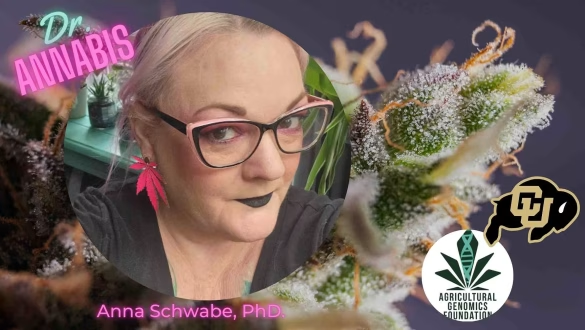Unearthing the DNA Secrets of Cannabis with Dr. Anna Schwabe
What if your favorite cannabis strain isn’t what the label claims? That’s the question driving Dr. Anna Schwabe, a leading scientist in cannabis genetics. Her work is changing the way we understand this complex plant — from mislabeled products to the real science behind the buzz.
After getting her start in molecular biology and botanical research at Colorado State University, Schwabe’s path took a sharp turn in 2012, when Colorado legalized recreational cannabis. Consumers began to notice that familiar strain names, like “Blue Dream,” felt different depending on the dispensary. Schwabe had the genetic tools — and curiosity — to investigate why.
DNA Doesn’t Lie: The Strain Name Game
Using DNA analysis, Schwabe studied more than 120 samples across 30 strain names in three U.S. states. The results were striking: many so-called identical strains were genetically different. In fact, her research revealed that cannabis strains didn’t fall cleanly into the popular categories of Sativa, Indica, or Hybrid. “The genetics just didn’t match what the labels were claiming,” Schwabe explained.
It didn’t stop there. She also analyzed federally supplied cannabis from the University of Mississippi — the only source approved for research in the U.S. — and found it was genetically distant from commercial cannabis. In short, researchers studying government-approved cannabis might be studying a plant far different from what consumers are actually using.
The Smell Test — And the THC Truth
Her research also sniffed out another surprise: cannabis with the same strain name didn’t even smell the same. A sensory study showed big differences in scent profiles, and more importantly, in THC levels. In a 2023 study of 23 samples, she found that THC numbers on product labels were, on average, 15% higher than the actual lab-tested content.
That’s a big deal. Since higher THC usually means a higher price, consumers are often overpaying for potency that isn’t there. And for medical users who rely on precise dosing, mislabeled THC content can mean missed outcomes — or dangerous ones.
“Lab shopping” — when companies seek labs that deliver inflated THC results — is a known issue. “It’s not just misleading,” says Schwabe. “It erodes consumer trust and raises questions about what else might be misrepresented — mold levels, pesticides, heavy metals?”
A Call for Transparency, Not Regulation
Schwabe doesn’t think genotyping cannabis should be mandatory. But making genetic testing more accessible could help confirm strain identities, protect breeders, and rebuild public trust. “People will pay more for something when they can trust it’s real,” she says.
Right now, verifying genetics is complicated. Testing costs vary, public databases are hard to use, and some private labs don’t share their data. Schwabe believes the industry needs better tools and transparency, not just regulations.
A Plant Like No Other
Cannabis is one of the most unusual plants on Earth. It’s one of only a small percentage of flowering species that are dioecious — meaning separate male and female plants — and its history of human cultivation has left a tangled genetic legacy. Because cannabis pollen travels far on the wind, there may not be any truly “wild” cannabis left.
Looking ahead, Schwabe sees potential in studying cannabis’s secondary metabolites, like terpenes, which influence aroma, flavor, and possibly pest resistance. Local strains may evolve unique traits depending on their environment — research that could benefit farmers and breeders alike.
There’s also growing interest in diseases like powdery mildew and hop latent viroid, both of which threaten cannabis crops. Outdoor, locally adapted strains might be better at resisting these infections compared to indoor-grown ones.
What’s Next?
Dr. Schwabe now serves as COO of CannaGen, a new platform that connects cannabis sellers and buyers with verified lab data — including genetic profiles and pathogen testing. She also works with the Agricultural Genomics Foundation, aiming to support farmers through field trials and genomic research.
Her mission? To bring clarity, science, and accountability to an industry that still operates in legal gray zones.
“The more we understand this plant, the better we can breed it, study it, and trust it,” she says.
Dr. Schwabe’s work sits at the forefront of a broader shift in cannabis science, where genetics, chemistry, and consumer transparency intersect. As the industry matures, more research is highlighting not only the complexity of the plant itself but its potential applications in public health. For instance, a Swiss study found that legal cannabis access may reduce problematic use, while other research explores how cannabis compounds might help treat aggressive childhood cancers like neuroblastoma. Additionally, with concerns around opioid dependency rising, some scientists are investigating whether THC-free cannabis terpenes could offer a safer alternative for pain management. Together, these findings underscore why a deeper, more accurate understanding of cannabis — from genetics to chemical profiles — is vital for both science and society.

